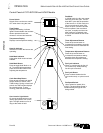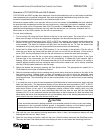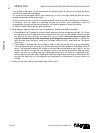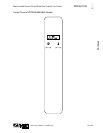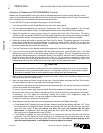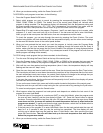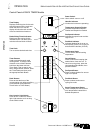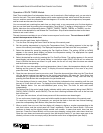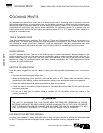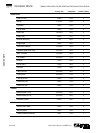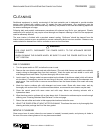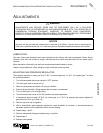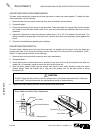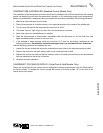
C
OOKING
H
INTS
M
ARATHONER
G
OLD
& S
ILVER
S
TAR
G
AS
C
ONVECTION
O
VENS
P
AGE
34 O
PERATOR
’
S
M
ANUAL
1181887
REV
1
COOKING HINTS
C
OOKING
H
INTS
In a standard (non-convection) oven, the air is relatively still and an insulating layer of moisture surrounds
the cooking food product. In a convection oven, the fan-blown circulating air strips away this insulating layer
allowing the heat to penetrate faster for quicker baking and roasting. Hence, in a convection oven cooking
procedures and techniques may require some modification for successful results. As a general rule, the
cooking time will be shorter and the cooking temperature will be 25°F to 75°F lower than those called for in
recipes for a standard oven.
TIME & TEMPERATURE
Time and temperature are important. The “Guide to Times and Temperatures” later in this section is a
starting point. The actual best cooking time and temperature will depend on such factors as size of load
and mixture of recipe (particularly moisture). Once an appropriate time and temperature has been
established for a particular product and load, you will find the result of succeeding loads to be similar.
OVERLOADING
Do NOT overload the oven. The size of the load that can be cooked satisfactorily depends largely on the
particular product. As a rule, five racks can be successfully used for shallow cakes, cookies, pies, etc. For
deeper cakes (such as angel food), use only three racks because of the size of the pan and the space
required for rising. For hamburger patties, fish sticks, cheese sandwiches, etc., a full complement of racks
and pans is usually satisfactory.
HELPFUL SUGGESTIONS
Here are some suggestions that will assist in getting the best possible performance from a convection
oven:
• Pre-heat the oven thoroughly before use.
• When re-thermalizing frozen products, pre-heat the oven to 50°F higher than the planned cooking
temperature. After loading, reduce the temperature setting to the appropriate cooking temperature.
• Space the racks and pans as evenly as possible to allow air circulation.
• Center the load on the racks to allow for proper air circulation around the sides. Do not cover the racks
completely with pans.
• Do not use a deep pan for shallow cakes or cookies, etc. Air circulation across the surface of the
product is essential.
!
WARNING
THE USE OF ALUMINUM FOIL CAN CAUSE HEAT DISTRIBUTION PROBLEMS IN OVENS.
EXTREME CARE MUST BE USED WHEN PLACING ALUMINUM FOIL IN THE OVEN TO ENSURE
THAT IT DOES NOT BLOCK OR CHANGE THE AIR FLOW. THE USE OF ALUMINUM FOIL MAY
VOID THE PRODUCT WARRANTY IF ITS USE IS ASCERTAINED TO BE A PROBLEM.
HOLDING FOOD BEFORE SERVING
Any food item prepared in steam table pans can be held until being served by setting the Hold thermostat
to 160°F. Examples include stuffed pork chops, oysters Rockefeller, and any vegetable entree.



